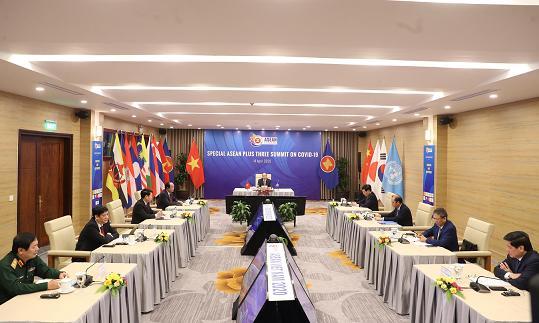BEIJING, April 15 (Xinhua) -- Accounting for over a quarter of the world's population with frequent personnel movement across the region, the ASEAN Plus Three countries have found themselves in growing unity to improve regional economic stability and curb the spread of COVID-19.
The contagious disease has created unprecedented challenges to global exchange and international trade as the International Monetary Fund (IMF) slashed economic growth projections for emerging and developing economies in Asia to 1 percent in its latest report from 5.8 percent in January.
"In fighting the epidemic, our fortunes are closely interconnected; in sustaining economic growth, our interests are closely aligned," said Chinese Premier Li Keqiang at a special summit of the Association of Southeast Asian Nations, China, Japan and the Republic of Korea (ASEAN Plus Three or APT) on COVID-19 via video link on Tuesday.
High on the agenda of the summit was restoring regional economic growth as quickly as possible, with China proposing specific measures like opening a "fast-track lane" for essential personnel on urgent visits in the fields of commerce, logistics, production and technological services.
Maintaining the necessary flow of people and goods is the first step towards the recovery of economic activities, said Zhang Yansheng, chief researcher of the China Center for International Economic Exchanges, noting that it is high time to clear barriers to logistics and the movement of personnel provided that APT countries form a united front to stem the spread of the virus.
With highly complementary industries and closely connected supply chains, the APT countries boast a total trade volume of over 10 trillion U.S. dollars, nearly half of which was trade made in the region.
The stable recovery of supply chains and market demand in East Asia will help push worldwide economic recovery and boost confidence in the global outlook, said Zhang. The economic fallout of the pandemic had prompted the IMF to project a 3-percent growth contraction this year in the "worst recession" since the Great Depression of the 1930s.
Also discussed at the summit was intensifying policy coordination to weather financial risks and challenges, with Premier Li calling for expanding the use of local currencies in regional trade and investment and advancing mechanisms like the Chiang Mai Initiative Multilateralization (CMIM), both expected to help fend off risks and ease market fears.
The CMIM, a currency swap arrangement between the APT countries that came into effect in March 2010, can be strengthened to address the international balance of payment and stabilize exchange rates, while credit cooperation is also imperative in ensuring liquidity for companies in a cash crunch amid pandemic strains, according to Zhang.
As a country having achieved notable progress in containing the virus, China is well placed to promote all-round cooperation among the APT countries to fight the pandemic.
In March, a special video conference on COVID-19 initiated by China was held among the foreign ministers of China, Japan and the Republic of Korea, in which the three countries agreed to explore a joint prevention and control mechanism to effectively prevent the cross-border spread of the epidemic.
At the summit on Tuesday, Premier Li announced that China will provide another 100 million face masks, 10 million protective suits and other urgently needed medical supplies to the ASEAN countries as grant assistance and via commercial channels.
He also called on the APT countries to share diagnostic and treatment experience, research data and information, and conduct joint research and development of drugs and vaccines.
"The battle against COVID-19 has made us more aware that we are in a community with a shared future," said Li.
If the APT countries realize the importance of the notion of a community with a shared future given their interests are closely aligned, the economic recovery in the region might be a highlight for the world economy in 2020, Zhang said.




 A single purchase
A single purchase









